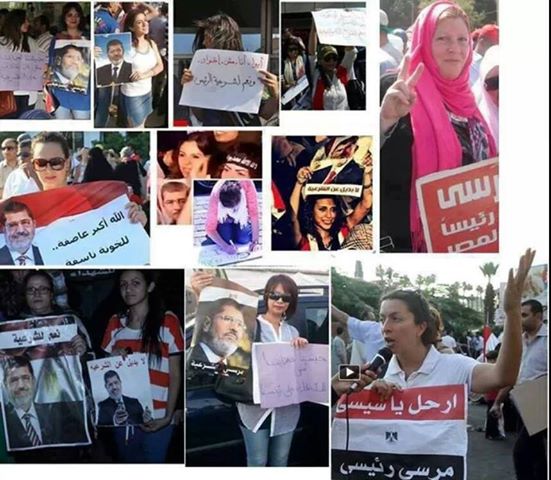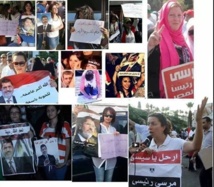The 2011 demonstrations in central Cairo were against the Supreme Council of the Armed Forces, the military junta that assumed power after the toppling of longtime dictator Hosni Mubarak in 2011.
On Monday, protesters chanted against the army and sprayed red paint on a monument the military-installed authorities are erecting in Tahrir Square, the scene of scores of protests over the last three years.
The government has presented the monument as a memorial to all those killed in Egypt's "revolution" since the outbreak of protests against Mubarak.
But its decision to inaugurate the monument on Tuesday, the anniversary of the November clashes, has incensed activists.
"Nothing has changed, the regime remains. We are against the military rule," protester Mohamed Mahmud said.
"For us, the revolution is still unfinished," his friend Hussein Safed said, adding that the two of them had participated in protests at the same place two years ago.
Graffiti on the monument read: Down with the betrayers: the military -- remnants (of the Mubarak regime) -- Brotherhood."
Other graffiti read: "This is not a memorial, it's a public scam."
At least 43 people were killed and more than 3,000 wounded in days of clashes between protesters and security forces that began on November 19, 2011, just nine months after Mubarak's ouster.
The SCAF handed over power the following year to Morsi, a veteran Muslim Brotherhood leader who won Egypt's first democratic presidential election.
But just one year later the army overthrew and detained Morsi following massive demonstrations against his turbulent rule and installed an interim government.
The security forces meanwhile launched a brutal crackdown on Morsi's Islamist supporters that peaked on August 14, when police moved in to disperse two pro-Morsi protest camps, killing hundreds of people.
The interim government has pledged a return to civilian, democratic rule, but the real power is believed to be held by military chief Abdel Fattah al-Sisi, whose popularity has soared since Morsi's overthrow.
The interior ministry warned of a firm response to any violence on Tuesday, amid calls for more rallies to commemorate the November 2011 clashes.
------------------------------------------------------------------------------------------------
On Monday, protesters chanted against the army and sprayed red paint on a monument the military-installed authorities are erecting in Tahrir Square, the scene of scores of protests over the last three years.
The government has presented the monument as a memorial to all those killed in Egypt's "revolution" since the outbreak of protests against Mubarak.
But its decision to inaugurate the monument on Tuesday, the anniversary of the November clashes, has incensed activists.
"Nothing has changed, the regime remains. We are against the military rule," protester Mohamed Mahmud said.
"For us, the revolution is still unfinished," his friend Hussein Safed said, adding that the two of them had participated in protests at the same place two years ago.
Graffiti on the monument read: Down with the betrayers: the military -- remnants (of the Mubarak regime) -- Brotherhood."
Other graffiti read: "This is not a memorial, it's a public scam."
At least 43 people were killed and more than 3,000 wounded in days of clashes between protesters and security forces that began on November 19, 2011, just nine months after Mubarak's ouster.
The SCAF handed over power the following year to Morsi, a veteran Muslim Brotherhood leader who won Egypt's first democratic presidential election.
But just one year later the army overthrew and detained Morsi following massive demonstrations against his turbulent rule and installed an interim government.
The security forces meanwhile launched a brutal crackdown on Morsi's Islamist supporters that peaked on August 14, when police moved in to disperse two pro-Morsi protest camps, killing hundreds of people.
The interim government has pledged a return to civilian, democratic rule, but the real power is believed to be held by military chief Abdel Fattah al-Sisi, whose popularity has soared since Morsi's overthrow.
The interior ministry warned of a firm response to any violence on Tuesday, amid calls for more rallies to commemorate the November 2011 clashes.
------------------------------------------------------------------------------------------------









 Home
Home Politics
Politics











